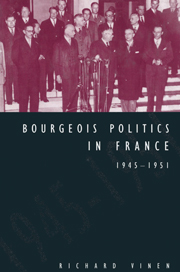Book contents
- Frontmatter
- Contents
- Preface
- List of abbreviations and French political groups
- 1 Introduction
- 2 A historiographic overview
- 3 International comparisons
- 4 Notables
- 5 Bourgeois parties and the female electorate
- 6 Organized business and politics
- 7 Administration
- 8 Opposition nationale
- 9 The Parti Républicain de la Liberté
- 10 Machine à ramasser les Pétainistes? The Mouvement Républicain Populaire and the conservative electorate
- 11 The Rassemblement des Gauches Républicaines
- 12 The Rassemblement du Peuple Français
- 13 Independents and Peasants
- 14 The Groupement de Défense des Contribuables
- 15 Conclusion
- Appendix. The electoral law of 1951 and apparentements
- Bibliography
- Index
13 - Independents and Peasants
Published online by Cambridge University Press: 06 July 2010
- Frontmatter
- Contents
- Preface
- List of abbreviations and French political groups
- 1 Introduction
- 2 A historiographic overview
- 3 International comparisons
- 4 Notables
- 5 Bourgeois parties and the female electorate
- 6 Organized business and politics
- 7 Administration
- 8 Opposition nationale
- 9 The Parti Républicain de la Liberté
- 10 Machine à ramasser les Pétainistes? The Mouvement Républicain Populaire and the conservative electorate
- 11 The Rassemblement des Gauches Républicaines
- 12 The Rassemblement du Peuple Français
- 13 Independents and Peasants
- 14 The Groupement de Défense des Contribuables
- 15 Conclusion
- Appendix. The electoral law of 1951 and apparentements
- Bibliography
- Index
Summary
The Centre National des Indépendants et Paysans (CNIP) was set up at the beginning of 1951 to preside over an electoral alliance between two parliamentary groups: the Centre National des Indépendants (CNI) and the Centre Républicain d'Action Paysanne et Sociale. It was a loose grouping that only really functioned at election time. Candidates presented by the CNIP decided which of its constituent groups in parliament they would join after their election.
Roger Duchet, who initiated the Centre and became its secretary general, was a self-consciously machiavellian senator from Burgundy. Like many Independents he had been a Radical before the war, and he had become mayor of Beaune at the unusually early age of 26. The functions of the CNIP were ill defined. Duchet was not a politician of great national prominence and he presented a modest view of his role. He suggested that the CNIP was merely a clearing house for electoral alliances. However, this apparently humble position provided Duchet with considerable power. This was reflected in the allegation that leaders of the CNIP were a hidden and self-selecting oligarchy. It was also reflected in the resentment that more established politicians, notably Paul Reynaud, came to feel towards him: in March 1951, a terse circular reminded Independents that the CNIP was just an administrative body ‘the titular secretary general of which has no power to lay down the policy of the Républicans Indépendants’.
- Type
- Chapter
- Information
- Bourgeois Politics in France, 1945–1951 , pp. 234 - 251Publisher: Cambridge University PressPrint publication year: 1995

